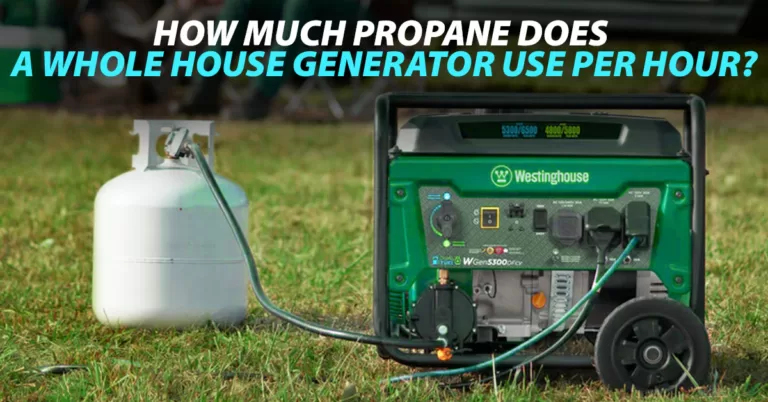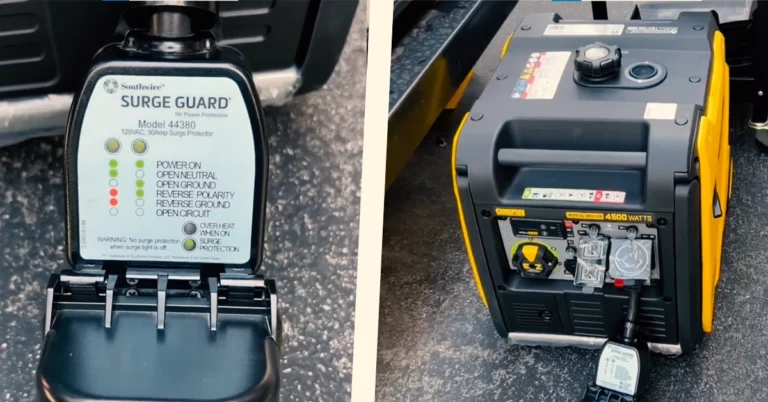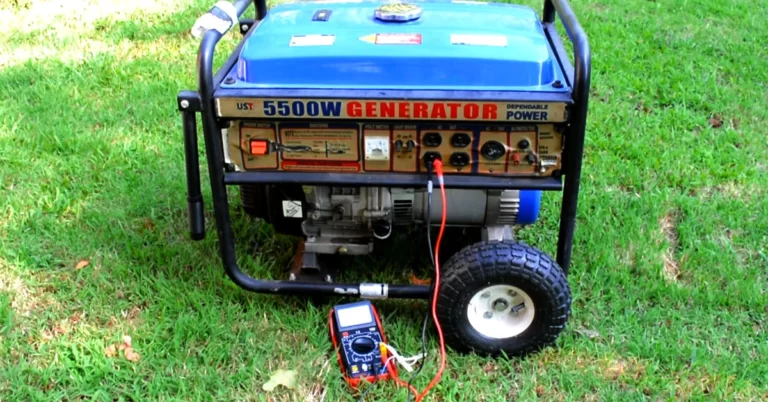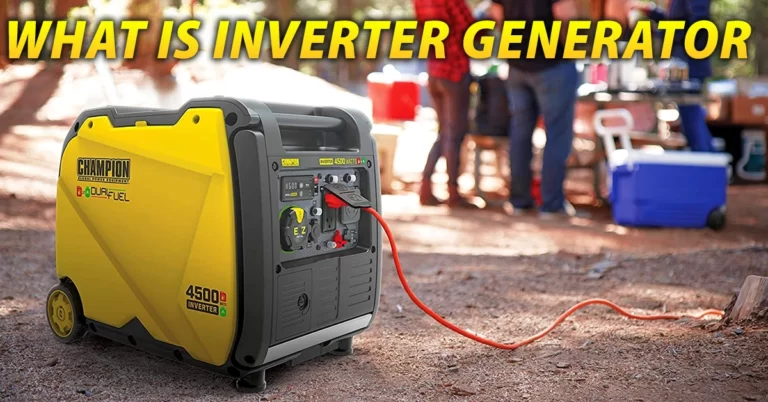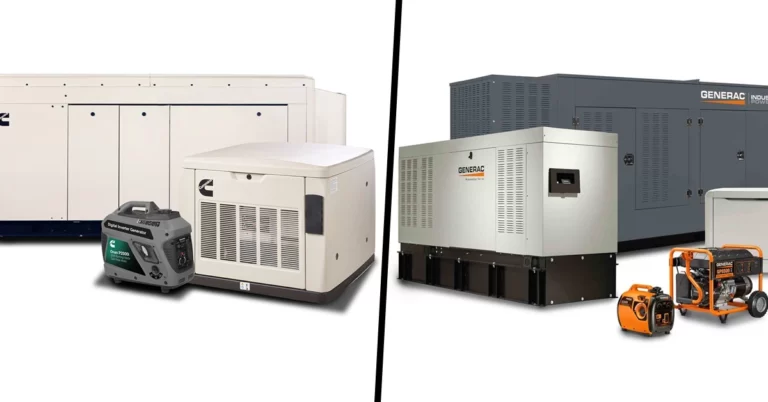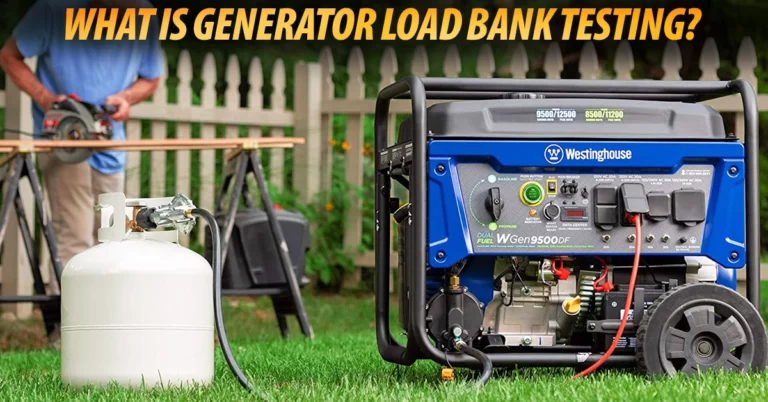How To Choose The Best Solar Generator For Your RV?
If you own an RV, you know that having access to reliable power while on the road is essential for a comfortable and enjoyable trip. That’s where a solar generator comes in – it’s a portable and self-contained power source that harnesses energy from the sun to provide electricity for your RV appliances and devices.
This guide will provide the information you need to choose the best solar generator for your RV. We’ll cover topics such as assessing your energy needs, choosing the right solar generator size, understanding battery requirements, considering additional features, and budget considerations.
When you finish reading this guide, you will have the information necessary to make an informed decision and locate a solar generator that can meet your RV power requirements. So let’s jump right in and get going!
How To Choose The Best Solar Generator For Your RV?
Assess Your RV’s Energy Needs
Start by creating a list of all the appliances and devices you’ll be used to estimate your RV’s power consumption. Next, determine each device’s power level (in watts). To calculate the overall power usage, add up all the devices’ power ratings. Remember that some appliances require electricity during both surges and continuous periods. A device requires surge power to start it, while it requires continuous power to keep it operating. Make careful to account for both when determining your power requirements.
Next, determine how much sunshine your RV will get each day. It will depend on factors such as the time of year, the area, and the weather. You can use a solar calculator to determine how much sunlight your panels will experience or how many hours are expected daily in your area.
You can select the ideal solar generator capacity by being aware of the power requirements of your RV and the anticipated number of hours of sunlight.
Choosing The Right Solar Generator Size
You can select a solar generator with the right amount of power production once you know your energy requirements. There are various sizes of solar generators, from compact portable models to larger generators that can power a full RV. Your energy requirements, financial constraints, and the available room will determine the size of the solar generator you select.
Small portable solar generators typically have a power output of 100-400 watts, making them ideal for powering small devices like phones, laptops, and lights. These lightweight and compact generators make them easy to transport and store. However, they may need to be more powerful to meet the energy needs of larger RVs or appliances like refrigerators and air conditioners.
Mid-sized solar generators are ideal for powering bigger appliances like refrigerators and Televisions because they typically have a power output of 400–1500 watts. These generators can be moved simply from one place to another and are still fairly portable. They might require more electricity to operate larger RV air conditioners.
Large solar generators can have a power output of 1500 watts or more, making them suitable for powering large RVs and appliances like air conditioners. These generators are heavier and bulkier than smaller models but can provide enough power to run multiple appliances simultaneously.
It’s essential to note that a solar generator’s power output is rated in watts, and this number represents the maximum amount of power the generator can produce at any given time. However, some appliances and devices have higher surge power needs, which can temporarily exceed the generator’s power output. It’s essential to consider both your appliances’ continuous and surge power needs when selecting a solar generator.
Consider Your Battery Requirements
A solar generator’s battery is the system’s heart, storing energy from the solar panels when the sun isn’t shining. When choosing a solar generator, it’s important to consider the type of battery and its capacity.
Solar generators use two main types of batteries: lithium-ion and lead-acid. Lithium-ion batteries are lighter and more efficient, while lead-acid batteries are cheaper and more durable. However, lead-acid batteries require more maintenance and shorter lifespans than lithium-ion batteries.
Battery capacity is measured in amp-hours (Ah) and refers to the energy a battery can store. To determine the appropriate battery capacity for your RV, calculate your devices’ and appliances’ total energy consumption and multiply that by the days you plan to be off-grid. This calculation will determine your RV’s battery capacity.
Look For Additional Features
When choosing a solar generator for your RV, look for additional features to enhance your camping experience. These features may include USB ports, AC outlets, and built-in inverters.
The solar generator has USB ports for charging your devices. Standard 120V AC outlets can power appliances such as coffee makers and televisions. Inverters convert DC power (from batteries) into AC power (for appliances that need it).
Other features to consider include portability, durability, and ease of use. Look for a solar generator that is lightweight and easy to transport, as well as rugged enough to withstand the rigors of outdoor use. Finally, ensure the solar generator is easy to operate and has clear instructions.
Consider The Solar Panels
Solar panels are essential to a solar generator system, as they capture and convert the sun’s energy into usable electricity. When considering solar panels for your RV, there are two main types: monocrystalline and polycrystalline.
Monocrystalline solar panels are made from a single crystal of silicon and are known for their high efficiency and sleek, black appearance. They are also more expensive than polycrystalline panels, made from multiple silicon crystals and have a bluish tint. While polycrystalline panels are slightly less efficient than monocrystalline panels, they are more cost-effective and are a good choice for RVers on a budget.
To determine the number of solar panels needed for your RV, you will need to consider your energy needs and battery capacity. First, calculate your daily energy usage in watt-hours by adding up the power consumption of all your appliances and devices. Then, divide that number by the hours of sunlight you expect to receive each day to determine the wattage of the solar panel array you will need.
For example, if your RV uses an average of 500 watt-hours per day and you expect to receive 6 hours of sunlight, you will need a solar panel array with a capacity of at least 83 watts (500 watt-hours / 6 hours of sunlight = 83.33 watts). However, it’s important to remember that solar panels only generate full-rated power under optimal conditions. Adding extra capacity to your system to account for less-than-ideal weather conditions is good.
Budget Considerations
Budget considerations are an important aspect to keep in mind when selecting a solar generator for your RV. The cost of a solar generator can vary depending on its features and power capacity. Generally, a basic solar generator with limited features will cost less than a high-end one with advanced features.
A solar engine can cost between a few hundred and several thousand dollars. The price largely depends on the generator’s capacity, the type of battery used, and the number of features it offers. For example, a solar generator with a larger battery capacity and more features will typically be more expensive than a smaller, basic model.
The trade-offs between price and benefits must be considered when setting a budget. While a more expensive solar generator may have additional features, a less expensive model may still meet your basic needs. It’s important to carefully consider the parts you need and those you can do without to find the best value for your budget.
One way to find the best value for your budget is to compare the features and prices of different solar generators. Reading customer reviews and considering the manufacturer’s reputation is also essential. There may be warranties or money-back guarantees included with solar generators, which can contribute to your peace of mind.
Factors To Consider When Buying A Solar Generator For an RV
Consider some things before purchasing a solar generator for your RV. These elements will assist you in selecting a solar generator that satisfies your power requirements and offers reliable and effective energy for your journeys. The following are some important things to think about:
Battery Capacity
One of the most crucial considerations when choosing a solar generator is its battery size. It also decides how much power the generator can generate and supply to the electronics and appliances in your RV. If your requirements for power are more substantial, look for a solar generator with a battery capacity of at least 1000Wh and, ideally, more than 2000Wh.
Charge Cycles
The number of charge cycles a solar generator can handle is important because it determines how long the battery will last. Look for a solar generator with at least 2000 charge cycles or more, ensuring that your generator stays for several years without losing its capacity.
Inverter Quality
The inverter is responsible for converting the DC power stored in the battery to AC power that your RV’s electronics can use. Look for a solar generator with a high-quality pure sine wave inverter, which will provide clean and stable energy for all your appliances.
Portability
Portability is important for RV solar generators because you must move them around frequently. Look for a solar generator that is compact and lightweight, with a convenient handle or wheels for easy transport.
Recharge Time
How quickly you can resume using your appliances and devices will depend on how long your solar generator recharges. Look for a solar generator that, ideally, uses solar panels and can be completely recharged in less than 6 hours.
Solar Panel Compatibility
Most solar generators can be recharged using solar panels, but not all solar panels are compatible with all generators. Ensure the solar panels you choose are compatible with your solar generator and provide enough power to recharge the battery fully.
Additional Features
Lastly, consider additional features you may value, such as extra AC outlets, USB ports, or an integrated MPPT charge controller. These characteristics can increase your solar generator’s adaptability and usefulness for various uses.
4 Best Solar Generators for Your RV
We will provide an overview of five of the best solar generators currently available in the market, highlighting their features, specifications, and capabilities to help you decide which one to choose for your needs.
Jackery Explorer 500

Jackery is a well-known solar generator and portable power station brand. From 240W to 1500W and bigger portable power stations, they provide a variety of solar generators with different power outputs. All of their products are great for RVers, but in this review, we will highlight the Jackery Explorer 500.
A portable power source with a lithium-ion battery pack that provides 518 Watt-hours of electricity is called the Jackery Explorer 500. (40.5 amp-hours at 12.8V). To power your 120-volt appliances, it has a 500-Watt inverter with a 120-volt AC outlet (500 Watts continuous with a 1000W peak to manage start-up/surge loads).
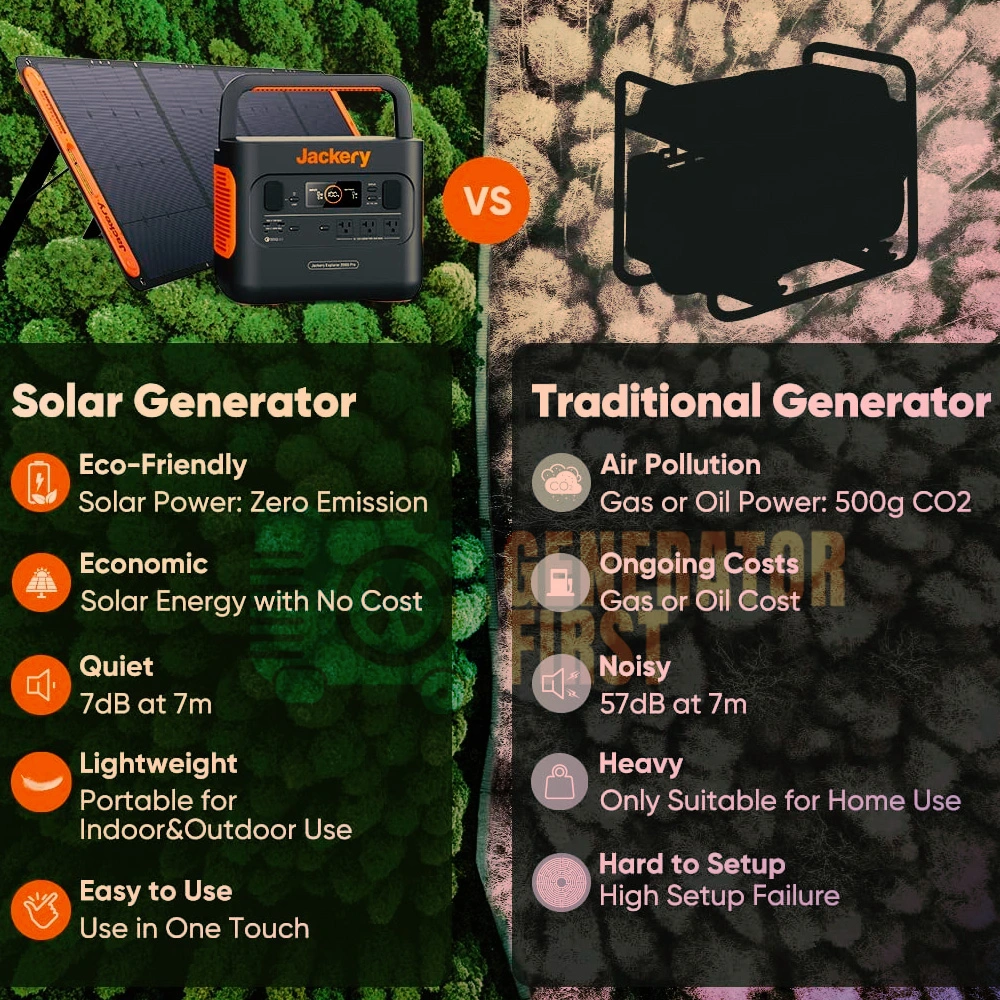
The Jackery 500’s support for pass-through charging and integrated battery control system is one of its best features. It has three USB-A ports and three 12V DC ports, one of which is a standard vehicle port, and three USB-A ports. With a strong handle that is a part of the casing, the Explorer 500 is readily transportable and is about the size of a basketball. It weighs 13.3 pounds.
The Jackery Explorer 500 does have a few drawbacks. This device charges from an AC wall socket in about 7.5 hours, your car’s charging port in about 16 hours, and a 100-Watt solar panel in about 9.5 hours (available through Jackery but sold separately). The highest rate of recharge for the Explorer 500 is 100 Watts.
Another point to remember is that Jackery uses lithium-ion NMC cells rather than lithium-iron phosphate (LiFePO4) batteries. Lithium-ion NMC cells might last less time than lithium-iron phosphate batteries, despite being lighter and having a greater energy density.

Bluetti EB70S
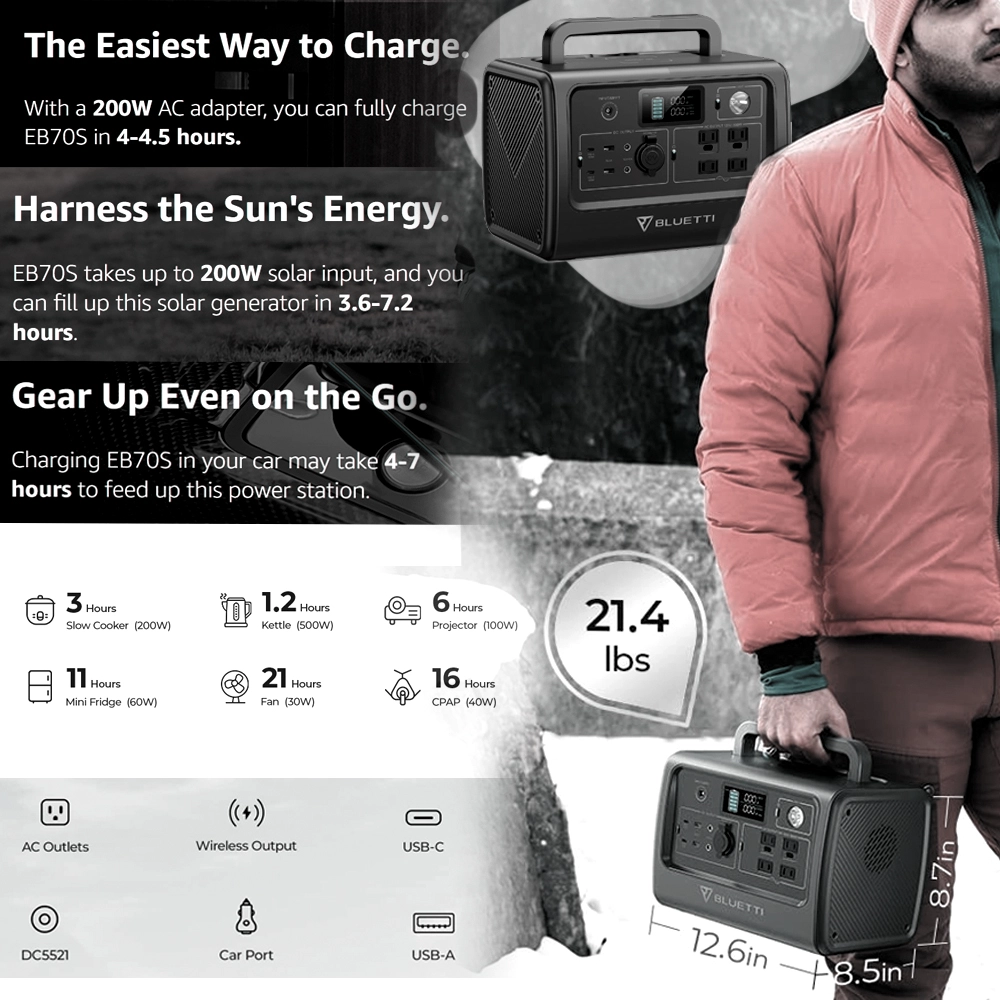
Bluetti is a well-known name in the solar generator industry, and their EB70S model is a compact and efficient option for RVers. With its LiFePO4 battery and 800-Watt inverter (with a peak output of 1400W), the EB70S is great for powering small to medium-sized appliances.
The Bluetti EB70S solar generator has a range of 12 outlets, including four 120V AC outlets, two 100W USB-C ports, two USB-A ports, one regulated 12V car socket, two DC (12V) ports, and a wireless charging pad. This range of ports allows versatile charging options for different devices and appliances.
The EB70S can be charged from solar panels or AC wall outlets and has a maximum charging capability of 200W. It has a charging time of around three hours, from 0 to 80%, with a compatible solar panel, which is very impressive. Bluetti recommends using their SP120 or SP200 solar panels for optimal charging.
Bluetti also includes:
- A 24-month warranty.
- An AC adapter with a charging cable.
- A car charging cable.
- One solar charging cable (DC7909 to MC4) with the purchase of the EB70S.
The EB70S has a LiFePO4 battery, a high-quality lithium-ion battery known for its safety, long lifespan, and stability. A built-in battery management system (BMS) protects the battery, which provides over-voltage, over-current, and short-circuit protection. Bluetti states that the EB70S has a life cycle of over 2500 cycles, which is impressive compared to other solar generators on the market.
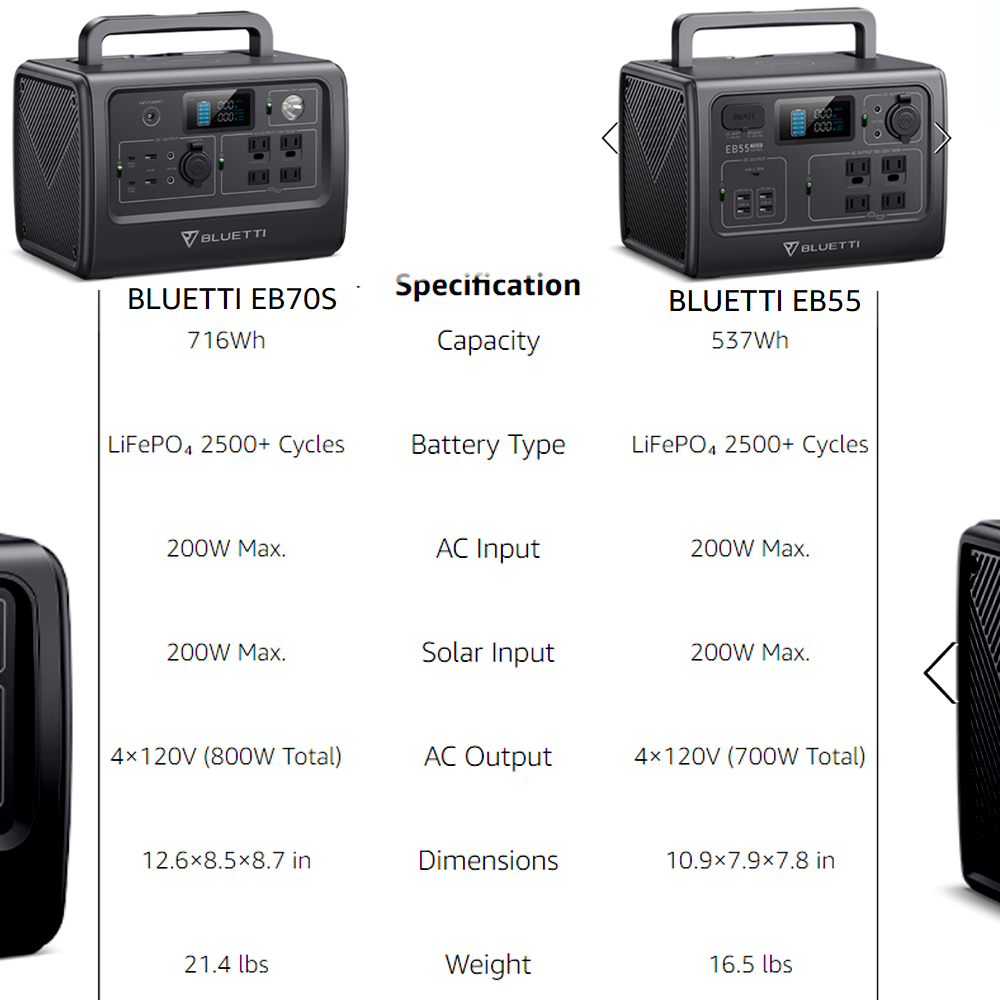
The EB70S weighs only 21.4 lbs, making it portable and easily transported. Its compact size makes it a great option for small RVs or those needing more storage space.
One major drawback of the EB70S is that it is only designed to power devices and appliances under 800W. If you have more power-hungry appliances, consider one of Bluetti’s larger solar generators, such as the AC200P or AC200MAX.

Goal Zero Yeti
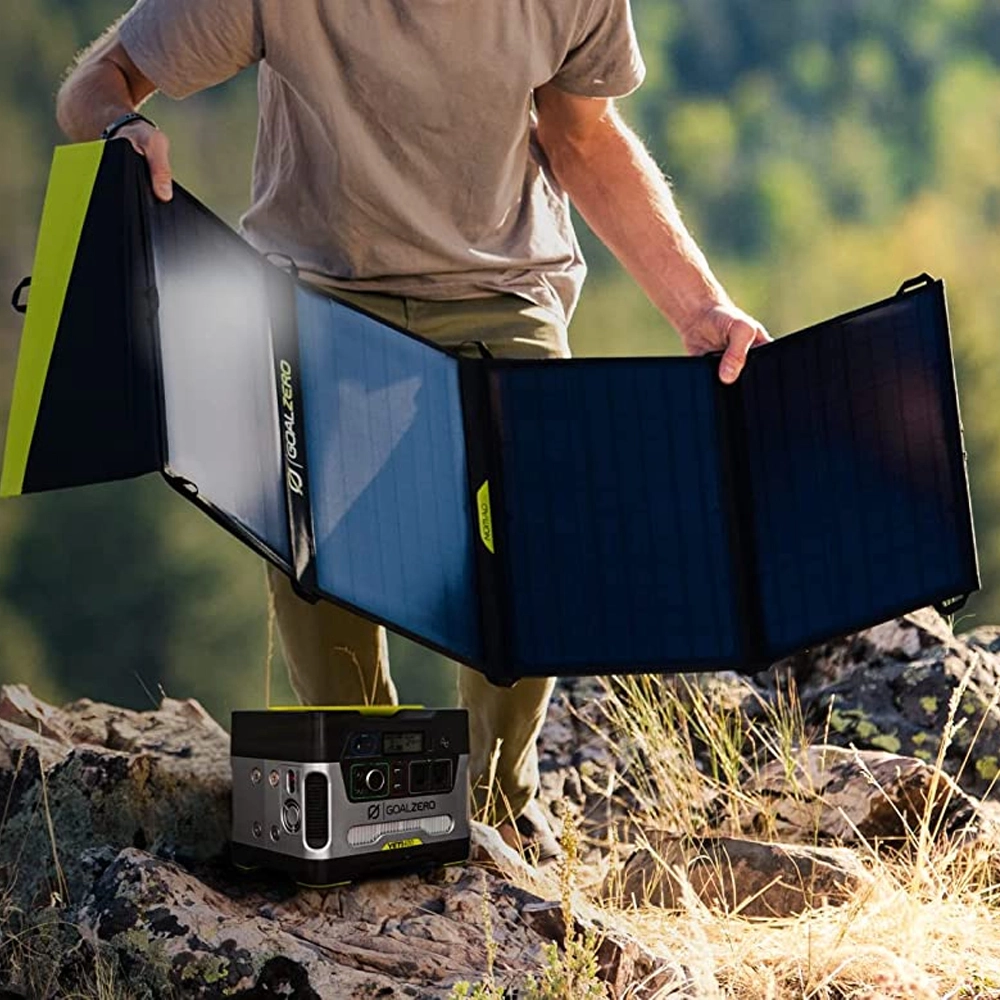
The Goal Zero Yeti series has long been a favorite of outdoor enthusiasts looking for a reliable portable power source. Goal Zero offers a range of solar generators with different sizes and capacities, from the compact 150 Watt-hour unit to the larger 6,000 Watt-hour unit. In this review, we’ll look closer at the Goal Zero Yeti 400, a mid-range unit that offers a good balance of price and portability.
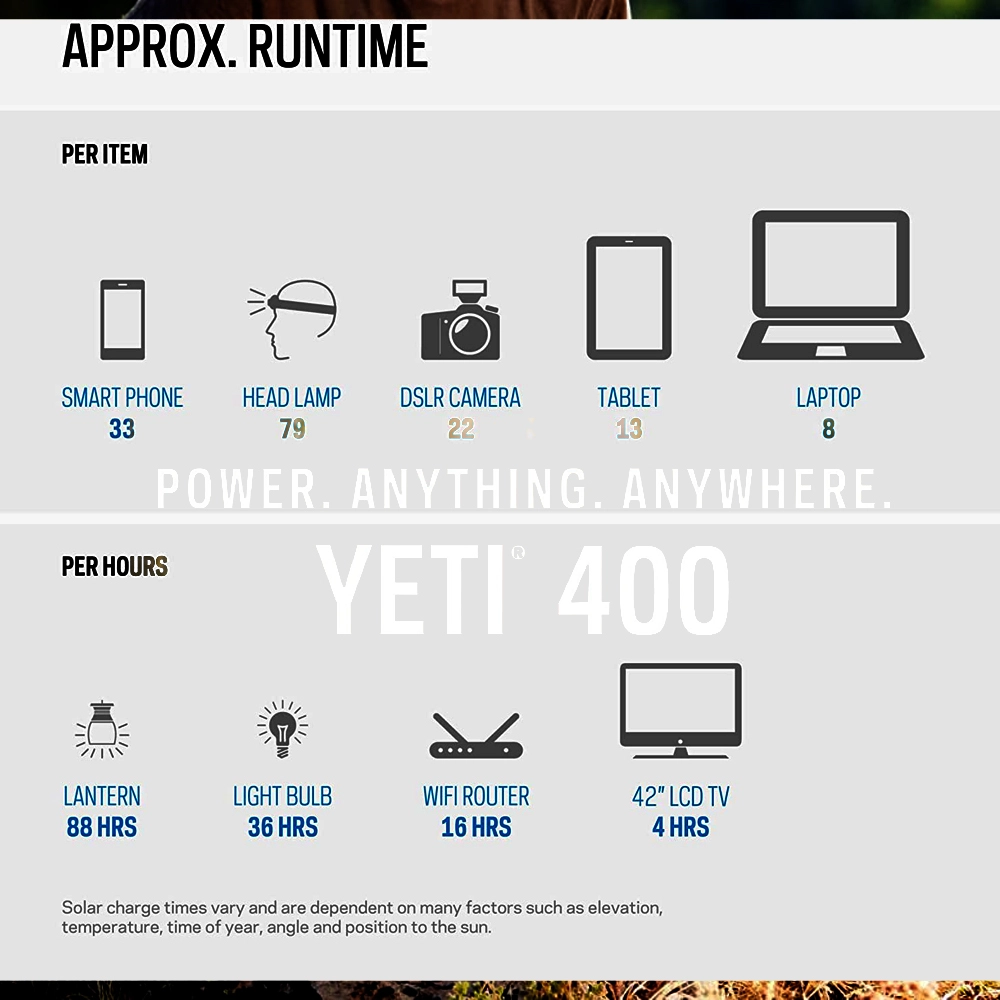
The Yeti 400 is a 396 Watt-hour lead-acid battery-powered generator that weighs 29 pounds. It can power up to seven devices simultaneously, with two USB-A ports, 12V ports, and 120V AC outlets. According to Goal Zero, it can charge a cell phone around 30 times and a mini-fridge for around 7 hours. The Yeti 400’s continuous 300W, 600W surge pure-sine wave inverter ensures clean and stable power for your sensitive electronics.
The Yeti 400’s portability is one of its primary benefits. It is lightweight (29 pounds), portable, and small enough to accommodate an RV’s storage space or a car’s trunk. Additionally, there are three simple ways to recharge it: a wall outlet, a 12V vehicle adapter, or a compatible solar panel. The solar panel is not included, but Goal Zero has a selection of solar panels compatible with the Yeti 400.
Goal Zero provides the Yeti 1000, which has a 1000 Watt-hour capability and a lithium-ion battery, for those who require more power. It has the benefit of being lighter and more effective, despite being significantly more expensive than the Yeti 400. It can be charged from a wall outlet or a 12V vehicle charger in about four hours and from a 300W solar panel. The solar panel is offered for sale individually, just like the Yeti 400.

EcoFlow Delta
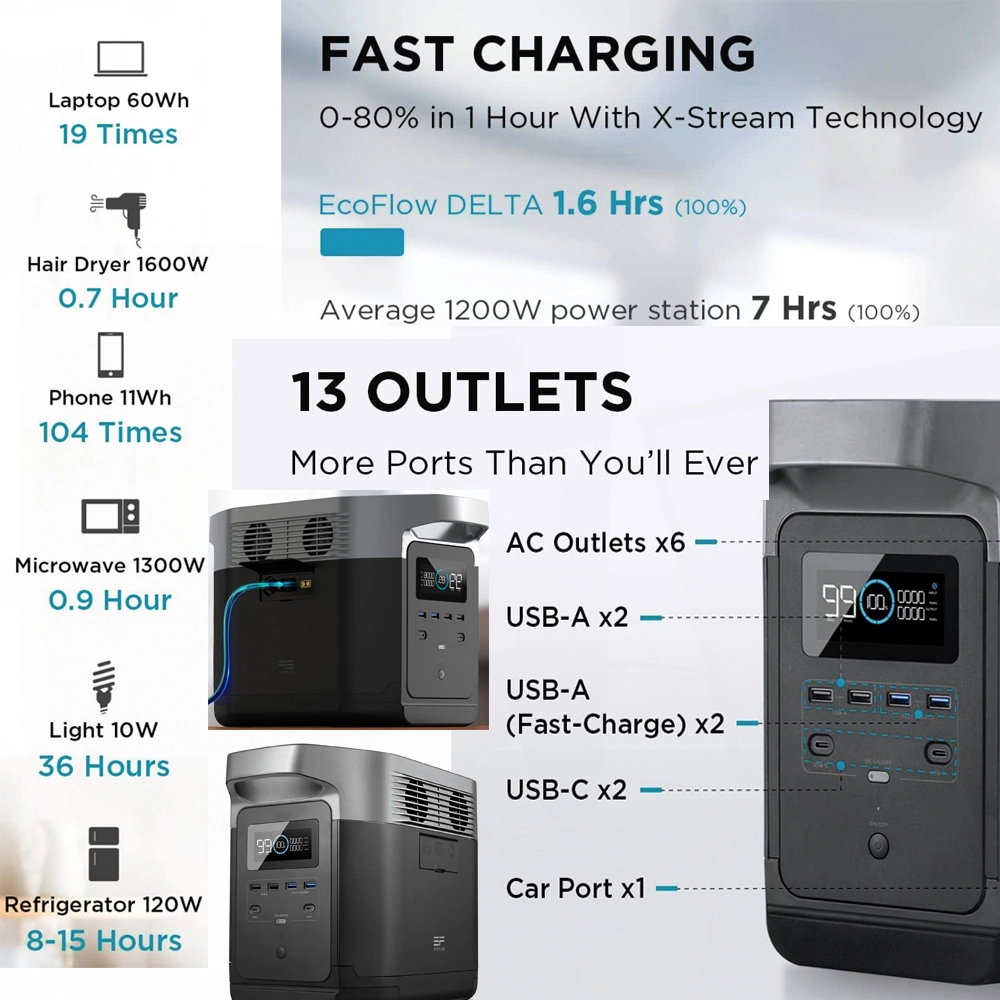
Leading solar generator maker EcoFlow provides various products to satisfy the demands of off-grid campers and adventurers. The EcoFlow Delta, a mid-sized solar generator with outstanding features and specifications, will be the subject of this study.
The EcoFlow Delta is a flexible and dependable energy source for various devices thanks to its amazing 1800W continuous power and 3300W surge power. The Delta provides different charging and powering choices with its six AC power outlets, two USB-C ports, two USB-A ports, two USB-A fast-charging ports, and one standard DC port.
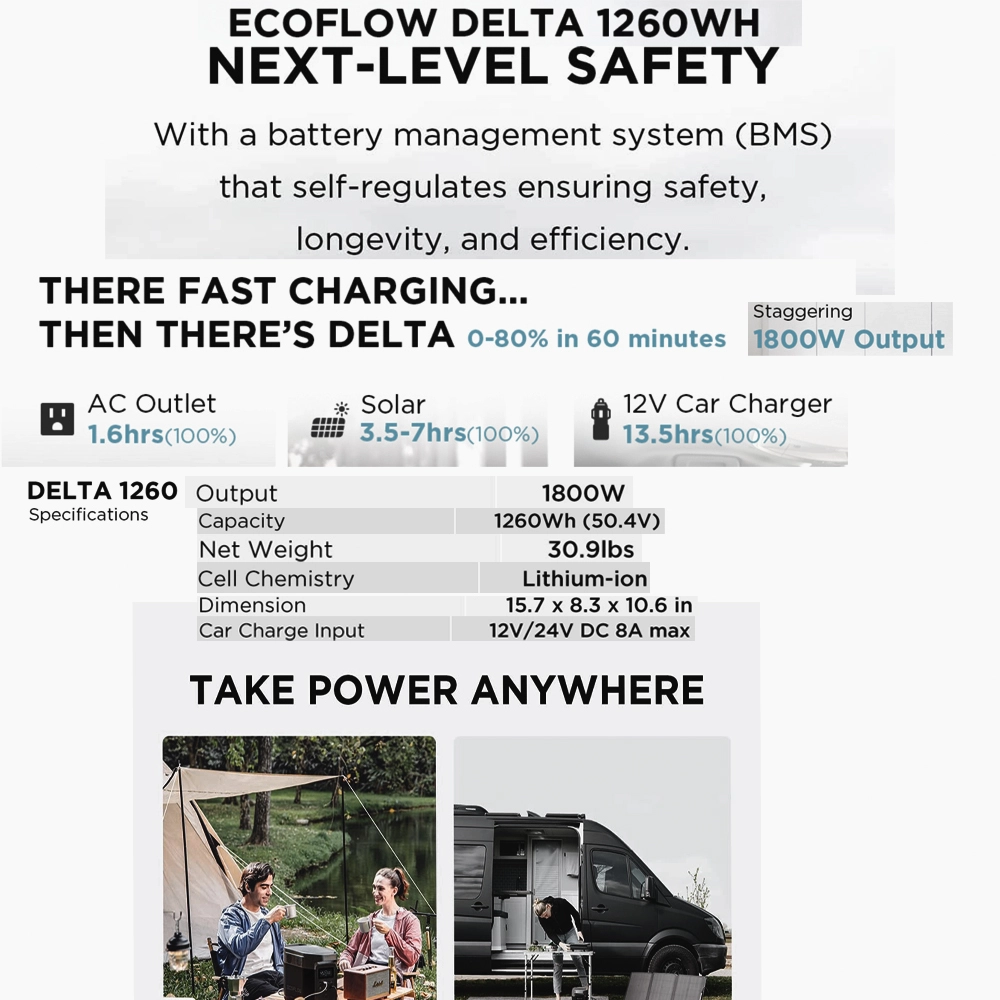
EcoFlow says that the Delta can be recharged from 0% to 80% using an AC outlet in under an hour compared to most portable power stations. Additionally, a 12V DC car charger can completely charge the Delta in 10–12 hours and take solar input of up to 400W. It is important to remember that solar charge times can change based on the solar panel’s input electricity and the outside weather.
One of the most potent portable power sources on the market, the Delta has a huge 1260Wh capacity. Despite having a powerful output, the Delta weighs only 30.9 pounds, which makes it convenient to use and carry.
The EcoFlow Delta’s price, which is higher than that of some similar solar generators on the market, could be a disadvantage. The Delta might be a good investment for those who need a lot of power and different charging choices.

FAQs
-
What Size Portable Power Station (Solar Generator) Do I Need for My RV?
Having a dependable power supply is crucial when RV camping. Portable power stations or solar generators are a great option for people who want to power their devices and utilities off the grid. However, what size movable power unit do you require for your RV? Your power requirements determine the result. A small power station will do if you only charge a few gadgets. However, you’ll need a larger power station if you need to charge bigger appliances, like a CPAP machine or a mini-fridge. Before buying, it is essential to ascertain what you need to power and how long. Once you know your wattage requirements, you can start looking for the best portable power station to suit your needs. For your RV camping journey, you can choose from a wide range of solar generators and panel sizes from many reliable companies.
-
What Is a Solar Generator for an RV?
The AC and DC outlets, USB ports, and other input/output ports typically included with these generators provide electricity for numerous electronic devices like laptops, cellphones, lights, and other crucial RV appliances. The RV’s roof or the ground can be used to place the solar panels that charge the generator, making them a dependable and green power source while traveling.
-
What Is a Portable Power Station?
Outdoor enthusiasts, campers, van lifers, and anyone needing a dependable power source while traveling will love portable power stations. They are also helpful when the power goes out unexpectedly, or you need to power crucial equipment during a power outage.
-
Why Would You Want a Solar Generator For Your RV?
Let’s say you’re a traveler looking for a dependable power supply while out. Your Motorhome would benefit greatly from a solar generator. It’s particularly helpful for people who need more room, money or desire to deal with installation difficulties associated with a large solar system. A solar generator can power various tiny devices and appliances, including computers, phones, tablets, and even a 12V refrigerator, depending on the size of the battery bank in your power source.
The mobility of a solar generator is one of its many benefits. It is portable and simple to travel from location to location. Outside the RV, bright regions can be used to recharge a portable solar panel. -
Why does my RV solar generator need a high battery capacity?
Your RV solar generator must have a large storage capacity to operate effectively. It’s necessary to use the battery as fuel by the solar generator, which fuels your electrical devices. The solar generator can run/charge your gadgets longer with higher battery capacity.
Lead-acid and lithium-ion batteries are two different kinds that are frequently used in solar generators. Due to their weight and highest discharge rate, lead-acid batteries are less efficient and only use about half their capacity. RV solar generators work best with lithium-ion batteries because they are lighter, have a higher energy density, charge more quickly, and discharge at a greater rate.
The amount of charge cycles your solar generator has is another crucial element. When a battery is fully discharged and then recharged to its full capacity, a charge cycle takes place. Your solar generator will last longer if it has more power cycles. A solar generator with at least 2000 charge sessions is advised for an RV. -
Why does my RV solar generator need a high-watt inverter?
Your RV solar generator’s ability to produce much electricity at once depends on its high-wattage inverter. You should estimate your energy requirements and pick a solar generator with an inverter that can have enough power to satisfy those requirements. A pure sine wave inverter is also favored because it generates cleaner energy and lessens the possibility of electrical noise or electronic crashes. When selecting the finest solar generator for your RV, remember these things.
-
Why does my RV solar generator need solar panels?
Thinking carefully about the kind and caliber of solar cells you buy is crucial. Monocrystalline panels will generate more energy per square foot than polycrystalline ones due to their greater efficiency. Additionally, they are stronger and typically have an extended lifespan.
Due to their light weight and ability to be installed on curved surfaces, flexible solar panels are also growing in popularity among RV owners.
Ultimately, your energy requirements and the area available for installation will determine the kind and quantity of solar panels you need for your RV solar generator.
End Words
It is essential to assess your energy requirements, financial circumstances, and the kinds of items you intend to power to make sure the solar generator you choose will satisfy your needs.
Ultimately, a high-quality solar generator is a great purchase for any RV owner because it gives them the flexibility to travel off-grid and enjoy the great outdoors with all the comforts of home.


